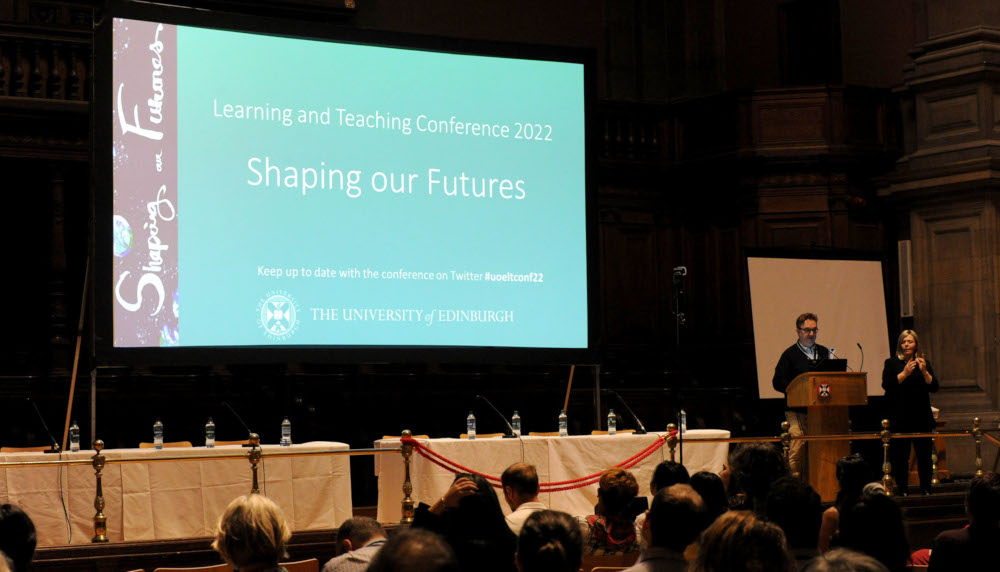
In this post, Itamar Kastner and Rebekka Puderbaugh from the School of Philosophy, Psychology and Language Sciences offer a considered reflection of their Learning & Teaching Conference experience, and highlight areas where staff and students could benefit from more support from across the University. This post is part of the Learning and Teaching Conference Hot Topic.
The recent Learning and Teaching Conference (LTC) was a wonderful opportunity to get inspired by our colleagues who invest so much energy in their teaching, a lot of which is directed toward course preparation and assessment. Staff design courses with particular learning outcomes in mind, and use specific pedagogical practices to foster learning. Students also have their goals, ranging from wanting to learn more about a subject, to obtaining a particular mark. This is why Curriculum Transformation acknowledges the need to provide students with a foundation for future learning, something which requires a variety of strategies. A key takeaway for us from the LTC was the importance of scaffolding information to give learners the structure and support they need as they learn new skills or content. In order to provide such support, however, we as teachers also need better support from the University itself.
Scaffolding
When teaching, it’s important to specify which aspects of the course are intended to meet the desired learning outcomes, and which are the tools used to achieve those aims. We may ask our students to demonstrate their knowledge by way of various tasks: write an essay; give a group presentation; solve a problem set; and so on. The form of these task demonstrations is rarely our main focus as educators, but students who are not already familiar with them may nevertheless be put at a disadvantage. As numerous LTC presentations emphasised, one way to ameliorate these challenges is to scaffold, or introduce materials and skills in a step-by-step manner, spending time to discuss the form of the task as well as the content.
For example, the workshop on “Building teamwork skills and experiences” highlighted the skills necessary for successful group work. Despite regularly assigning group projects to our students, we don’t usually devote time to helping them think about how to work in small teams. Without scaffolding this skill for our students, the group activity itself can stand between the students and the desired learning outcomes. Worse still, they won’t necessarily reap the benefits of learning to collaborate.
Assessment and Marking
In order to determine what our students learn, we use various forms of assessment. However, student outcomes are determined by degree classifications that are based entirely on numeric marks, a practice that UK universities insist on but which does not support learning in its own right. In fact, a growing body of work has been arguing against marks, highlighting for example how marking ranks students against each other. Yet ranking students doesn’t feature in the University’s Student Vision, nor was it one of the principles of feedback and assessment presented at the LTC “Feedback & Assessment Workshop”.
Pedagogical theory has been gradually turning toward active models of teaching that allow for creative expression and innovative assessment. Unfortunately, integration of novel approaches to assessment is often stymied by baroque systems of marking and moderation (Itamar’s LTC Short Talk with our colleague, Sumin Zhao, on multimodal coursework showcased one exception to the rule). As educators, we invest time and effort into creating classrooms that foster deep learning, all the while having to uphold marking conventions that focus on deadlines and passive learning. Scaffolding and active learning facilitate lifelong learning; traditional marking pits students in competition.
Just as structured guidance scaffolds student learning, our assessment schemes should be scaffolded to reflect our values. One potential approach is to explore with staff the merits of marking on a “pass/fail” basis or “contract grading”. Such rubrics allow students the freedom to explore the course content and attend to feedback without the pressure of trying to achieve top marks, thereby freeing up instructors to provide meaningful feedback. Students then engage with feedback, rather than trying to game the system.
Conclusion
Ultimately, the conference was a bittersweet experience for us. It was inspiring to see so many colleagues invest so much energy in teaching and learning (sometimes together with students). Conversations with peers during and following the conference indicate a real willingness for change, yet it is unclear how we as staff would be supported when approaching challenges of marking and assessment. We are not aware of any top-down initiatives within Curriculum Transformation to rethink the way degree classifications are assigned, make changes to the common marking scheme, or provide relevant training for instructors, for example.
At the same time, we are asked to redesign our programmes even though staff goodwill is waning as employers take stands that cut pensions, let pay plummet, delegate teaching to precariously employed staff, and make no commitments regarding pay inequality or workload. At some universities, management and union branches have been able to release joint statements about the way forward. We hope our university will soon be among them, supporting us the same way we’re working to support our students in their learning. The LTC was a wonderful experience, but if we are to continue providing innovative and high-quality teaching, we also need proper support from the University.
Itamar Kastner
Itamar Kastner is a Lecturer in the Cognitive Science of Language and Director of the MA Cognitive Science in the School of Philosophy, Psychology and Language Sciences. His research investigates the structure of words from theoretical, experimental and computational perspectives. He and fellow PPLS linguists, Rebekka Puderbaugh and Stefano Coretta, are co-organisers of a themed session on ‘Advances and challenges in teaching linguistics at university’ in the upcoming annual meeting of the Linguistics Association of Great Britain and Northern Ireland.
Rebekka Puderbaugh
Rebekka Puderbaugh is a Teaching Fellow in Phonetics and Postgraduate Tutor Coordinator for Linguistics and English Language in the School of Philosophy, Psychology and Language Sciences.



